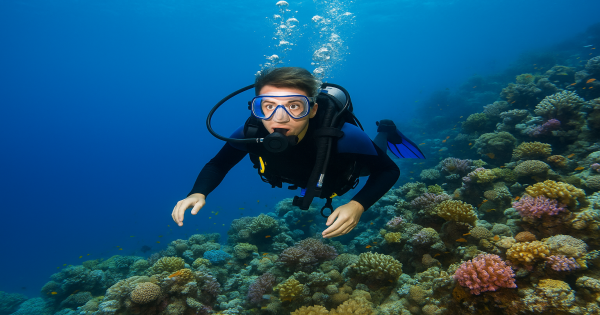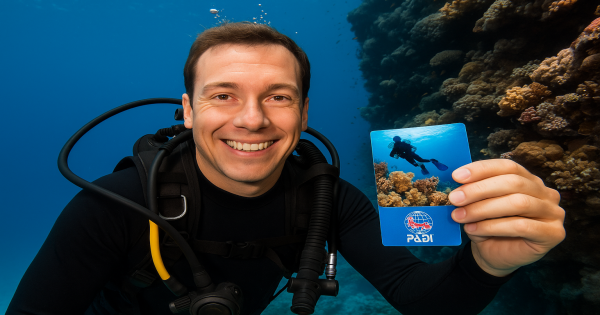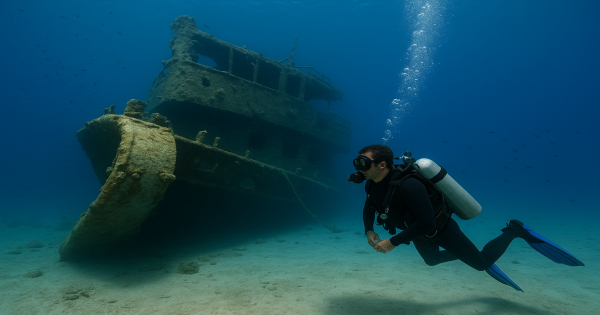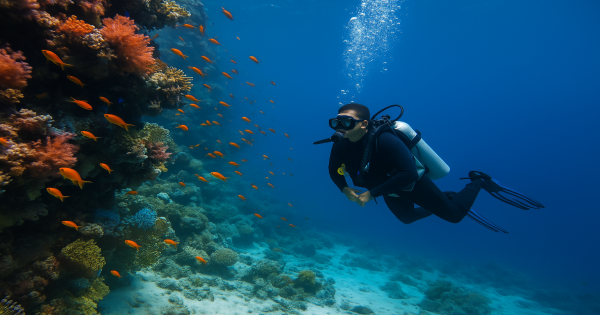Blog Details
fear of diving
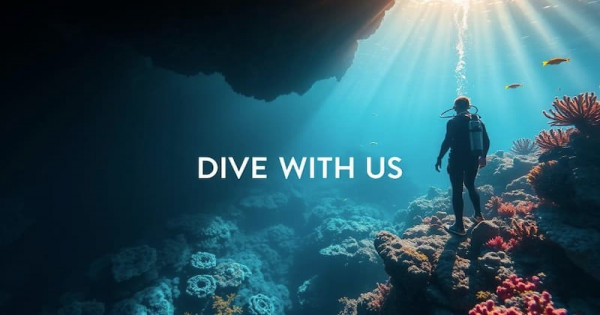
For many, the idea of scuba diving can be scary. But, with the right steps, you can face your fears and dive into the underwater world. It takes time and effort to overcome diving fears. Yet, the joy and discoveries you'll make are worth it.
Completing a dive can give you a great sense of achievement. You'll also get to see the beauty of marine life. By following a guide to overcome diving fear, you can build your skills and confidence. With patience and the right training, you can enjoy the thrill of diving.
Key Takeaways
- Understanding the root causes of diving fear is essential to overcoming scuba diving anxiety
- Professional training is a critical component of building confidence and overcoming fear of diving
- Overcoming diving fears takes time and practice, but the rewards are well worth the effort
- Developing the skills and confidence needed to become a proficient diver can help individuals manage their fear of diving
- With the right approach, anyone can learn to overcome their scuba diving anxiety and enjoy the many benefits of diving
- Patience and practice are essential to overcoming fear of diving and becoming a confident diver
Understanding the Root Causes of Diving Fear
For many, diving seems daunting. It's key to know why to beat this fear. Dive phobia stops some from enjoying scuba diving. To conquer fear of underwater diving, we must find out what's holding us back.
Fear of the unknown, loss of control, and injury are common barriers. These fears can be too much, making it hard to start scuba diving confidence-building. But, with the right help, we can face these fears and dive with confidence.
To beat diving fear, we must know its signs like a fast heartbeat and shaking. Seeing these signs helps us manage our anxiety. It's the first step to conquer fear of underwater diving.
Common Psychological Barriers
- Fear of the unknown
- Fear of loss of control
- Fear of injury
By tackling these fears and learning to manage them, we can build scuba diving confidence. With the right mindset and dive phobia treatment, anyone can dive and love exploring the sea.
The Science Behind Fear of Diving
Our brain's fear system is key in fear of diving. It's meant to keep us safe from dangers. For scuba diving, it can be triggered by new places and gear. Knowing how scuba diving anxiety works helps us find ways to beat it.
Fear can make our heart race, blood pressure go up, and breathing quicken. These signs are meant to get us ready to face danger. But in diving, they can be risky. By learning to control these signs, we can feel safer and more confident underwater.
To beat scuba diving anxiety, we need to tackle the mind and body issues. Education, training, and practice are key. By understanding our fear and learning to manage it, we can enjoy diving more.
Breaking Down Common Diving Myths
Many people are scared to dive because of myths and misconceptions. Overcoming diving fears and managing apprehensions are key to becoming a confident diver. These myths hold people back from exploring the underwater world.
It's important to know the truth about diving. Many believe diving is very risky, but it's actually safer than many adventure sports. By learning the real facts, people can make better choices and face their fears.
Debunking Common Myths
- Diving is only for the young and fit
- Diving is a high-risk activity
- You need to be a strong swimmer to dive
Learning from experts can help manage diving fears. Experienced divers and instructors share their knowledge. This helps people understand safety measures and risk reduction techniques.
Real Statistics on Diving Safety
Building Confidence Through Professional Training
Professional training is key for building scuba diving confidence. It offers a fear-free diving experience. With a qualified instructor, you can learn the skills and knowledge for safe diving.
Scuba diving certification programs, like those from PADI, help overcome fears. They build confidence in diving abilities.
Professional training offers many benefits:
- Personalized instruction and feedback
- Hands-on experience and practice
- Opportunities to learn from experienced instructors
Investing in professional training boosts confidence and skills for diving. It's important to find a program that fits your needs and learning style. With the right training, anyone can become a confident scuba diver, ready to explore the underwater world.
Women's Perspectives on Conquering Diving Fears
Empowering women in diving is key to beating the fear of diving and scuba diving anxiety. Many women have faced their fears and become certified divers. They now explore the underwater world with confidence.
Beating diving fears needs a supportive and welcoming place. That's why events like PADI Women's Day are vital. They celebrate women in diving and let them share their stories to inspire others.
Success Stories from Female Divers
- Many female divers have shared their stories of overcoming fear and achieving their diving goals.
- These stories inspire and motivate others who face scuba diving anxiety.
- Female divers show that with the right training and support, anyone can conquer their fears and enjoy diving.
PADI Women's Day Initiatives
PADI Women's Day initiatives aim to empower women in diving. They provide the skills, knowledge, and support needed to overcome fears and reach diving goals.
Female-Focused Training Approaches
Female-focused training addresses the specific needs and concerns of female divers. It helps them build confidence and overcome their fears.
DIVE WITH US offers programs and certifications that match the spirit of PADI Women's Day. They give women the chance to learn from experienced instructors and connect with other female divers.
Progressive Exposure Techniques for Diving
Getting over a dive phobia needs a slow and careful way. One good method is progressive exposure techniques. These help people conquer fear of underwater places. It's about slowly getting used to diving to feel more confident and less scared.
Starting small is key in progressive exposure. For instance, someone might first just be near water. Then, they might wear diving gear. Finally, they could take a dive. This slow step-by-step helps them get used to their fear and feel more confident in dive phobia treatment.
Progressive exposure has many benefits. It boosts confidence, lowers fear, and makes diving better. By slowly facing their fears, people can learn to conquer fear of underwater and enjoy diving.
- Gradual exposure to the feared situation
- Building confidence and reducing anxiety
- Improved overall diving experience
With patience, persistence, and the right steps, people can beat their dive phobia. They can then explore the underwater world with excitement.
Essential Safety Measures That Build Trust
Building confidence in scuba diving is key for a worry-free experience. It's vital to focus on safety measures that build trust. Knowing the importance of safety protocols makes divers feel more secure and confident.
Equipment knowledge is a big part of safety. Getting to know your gear and how to use it can lower anxiety. Also, communication underwater is crucial for a safe dive. Hand signals and other non-verbal ways help you stay connected with your team.
Emergency Procedures Knowledge
Understanding emergency procedures is also essential. This includes knowing what to do in equipment failure, strong currents, or marine life encounters. Being ready for any situation lets you dive confidently and enjoy your experience.
Some important safety tips include:
- Regularly check and maintain your equipment
- Stay within your depth and time limits
- Keep an eye on your air supply and navigate safely
- Be aware of your surroundings and potential hazards
By following these tips and prioritizing safety, you build trust in yourself. This leads to a more enjoyable and worry-free diving experience. Building scuba diving confidence takes patience, practice, and a commitment to safety.
Mental Preparation Strategies
Managing diving fears needs both physical and mental prep. Learning to control your thoughts and feelings is key. This helps build confidence and lessens fear. Techniques like meditation, visualization, and positive self-talk can help.
Here are some ways to tackle diving fears:
- Try relaxation methods like deep breathing and muscle relaxation
- Imagine yourself diving well
- Change negative thoughts to positive ones
Overcoming diving fears also means growing and being open to new things. Seeing challenges as chances to grow helps build resilience. Remember, overcoming fears takes time and patience.
Using these mental strategies can make diving better and more fun. It's for everyone, whether you're new or experienced. With the right mindset and practice, you can face your fears and enjoy diving.
Support Systems and Community Building
Overcoming the fear of diving needs a full approach. This includes support systems and building a community. Many divers find that being in a community helps them feel less anxious about scuba diving. DIVE WITH US is a community that offers a supportive space for divers to connect, learn, and grow.
Some benefits of community building for divers include:
- Connecting with experienced divers who can offer guidance and advice
- Access to group training and mentorship programs
- Opportunities to participate in diving events and activities
Being part of a community lets divers share their experiences and learn from others. This supportive environment helps build confidence. It makes diving less scary and more enjoyable.
With the right support and community, divers can face their fears and reach their diving goals. Whether you're new or experienced, being in a community can greatly impact your diving journey.
Conclusion: Taking the Plunge with Confidence
The fear of diving can be a big hurdle, but it's conquerable. By understanding the root causes of diving apprehensions and debunking diving myths, you can gain confidence. This confidence is key to diving without fear.
Getting professional training and using progressive exposure techniques helps you face your diving fears. A supportive diving community can also help a lot. They offer encouragement and guidance to help you go beyond your limits.
The diving experience is full of wonder and excitement. By beating your diving fears and exploring the underwater world, you open up to a world of fear-free diving. This world is full of unforgettable memories. So, take the plunge with confidence - your next adventure is waiting!
For more details on DIVE WITH US and how we can help you overcome your diving apprehensions, visit our website or get in touch with us today.
FAQ
What are the common psychological barriers that contribute to diving fear?
Fear of the unknown, loss of control, and injury are common barriers to diving. These fears can hold you back from enjoying the underwater world.
How can I identify my specific triggers for diving fear?
To tackle your diving fear, first identify what scares you. Think about your past dives and what made you anxious. This will help you face your fears head-on.
What are some common diving myths that contribute to fear?
Many myths make diving seem scary. For example, some think diving is always dangerous or that you must be a great swimmer. But, with the right training and precautions, diving is safe.
How can professional training help build my confidence for diving?
A good diving instructor can be a game-changer. They offer personalized advice, teach you the skills you need, and help you see diving in a positive light.
What are some progressive exposure techniques I can use to overcome my fear of diving?
Start by diving in shallow water and gradually go deeper. This method helps you face your fears step by step. It's a safe way to build confidence.
How can understanding my diving equipment and emergency procedures help build trust and reduce fear?
Knowing your gear and emergency plans can make you feel more in control. It helps you trust yourself and feel safer while diving.
What mental preparation strategies can I use to manage my diving apprehensions?
Use visualization, deep breathing, and positive affirmations to calm your mind. These strategies can help you stay focused and build confidence.
How can a supportive diving community and mentorship programs help me overcome my fear of diving?
A supportive community and mentors can offer the encouragement you need. They share their experiences and provide guidance, helping you overcome your fears.
